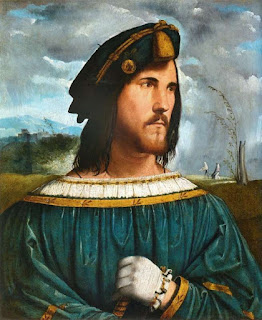Machiavelli's The Prince: An analysis and overview of The Prince and its secondary sources
"The legation to Cesare Borgia" by Machiavelli is a set of letters sent to The Ten describing and informing his lords of the actions he is taking while on a diplomatic mission for Ceasare Borgia. In Machiavelli's The Prince In the chapters talking about the character and personality traits of princes it is much derived and even stated to be partially based on Cesare. The article is made up of letters from Machiavelli's diplomatic mission detailing his experience with Cesare. The main point of these letters is to outline the source of Machiavelli's source for the prince and how he wrote parts of it. Because of the many diplomatic missions, he took as secretary to The Ten he garnered much experience with many lords and princes influencing his book "The Prince" A prime example is when he remarked " I had left my own horses and servants behind, I presented myself immediately, in my Traveling clothes. To his excellency, who greeted me warmly, and had given my credential." (Pedulla 94). This quote shows the vast journey and trouble he took to visit and speak with Cesare and the way he wards his letter hints at his admiration towards the man. The haste and actions show the importance of this figure to Machiavelli and since he is a prince and is sited in his book you can see as to how influential Cesare was to his writing of "The Prince".
 |
| Cesare Borgia Cardinal 1475-1507 |
Overall, I find Machiavelli's "The Prince", to be a worthwhile read. As it relates to modern day reading much of it is still relevant and can be used today when learning how to lead or manage (Given a slight modern interpretation down to its main points), Besides applying it to oneself we can also apply it to rulers or leaders in modern society and how his ideas and thoughts are still relevant to modern days leaders and how they choose to rule. Given its old nature but still relevant context for the 21st century when reading the prince, it is a wise decision to get through the secondary sources as it gives context to the life, events and general understanding around Machiavelli. Without the secondary sources it makes it hard to understand some of the references made in the book and the events he talks about, but with them the work makes more sense in understanding the context of why and how he wrote the work. When choosing to read "The Prince" the struggle I had while reading it was recognizing key events and characters Machiavelli talked about. Instead, I focused on the overall aspect and key teaching points he was trying to make about leadership. As you would read it leave notes grouping the chapters as each group of chapters deals with a different subset of leadership and how leaders should be from: How they should act, types of leaders, types of armies, and types of leaderships. In the end, "The Prince" is worth reading due to its still practical relevance on leadership whether it's for managing or applied to how world leaders act.
 |
| Niccolò Machiavelli Diplomat 1469-1527 |
Since the work "The Prince" is set up as a how to guide for monarchs and rulers such as them much of the information pertains to garnering power as a sole leader and how to keep it. But boiled down when reading the text some of the ideas written by Machiavelli can be applied to current leaders in society and to some in everyday life like managers or supervisors. If you compare the secondary sources and the primary sources in how they are broken up into sections, you can see the influence in how Machiavelli wrote "The Prince". The secondary sources cover parts of Machiavelli's life showing where he derived these ideas of successful ruling by working as a diplomat and observing lords and princes in his political duties. In one secondary source it provided background knowledge on how Machiavelli knew and observed one prince Cesare Borgia. In this source its recalled through a series of letters sent from Machiavelli to his lords who had him on a diplomatic mission to see the Borgia. In one quote "Finally, he concluded that I should write three things to your lordships. first, . . . he requested that I write and ask you to make every possible demonstration of friendship for him. (Machiavelli 102). This brief section from one of his letters shows how Machiavelli worked with one of the princes and the time spent with them; showing in some way how he learned and watched rulers to create the advice he gives in "The prince". Combined with his secondary sources the 'The prince" is given much more context to Machiavelli's experience and how he draws many of his comparisons of advice to many leaders of Europe at the time.
Overall, Machiavelli is a short political essay about his thoughts and ideas on how rulers should maintain power and either keep it or get it. He achieves this through outlining the options a leader has to ruling and how and narrowing it down to which is the most successful. Combined with its secondary sources it clarifies and adds to how Machiavelli drew these ideas and conclusions based on his experience with many European leaders.
Bibliography
Machiavelli Niccolò, and Wayne A. Rebhorn. The Prince: A Revised Translation, Backgrounds, Interpretations. W.W. Norton & Company, 2020.
Machiavelli Niccolò. The Prince Machiavelli. 2010.

Comments
Post a Comment